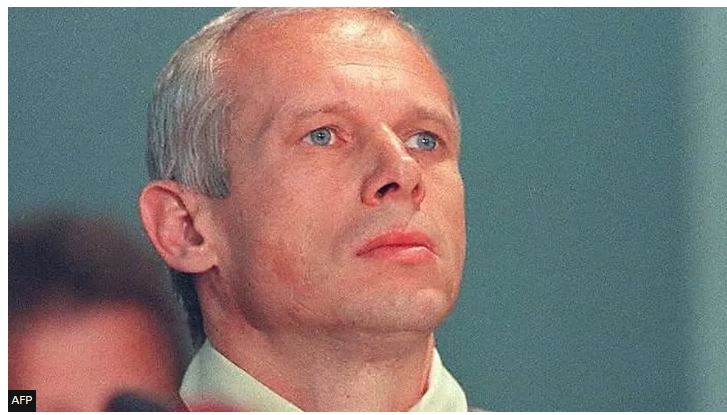Killer of South African anti-apartheid hero Hani freed on parole

South Africa on Wednesday released on parole Janusz Walus, a far-right Polish immigrant who in 1993 assassinated anti-apartheid hero Chris Hani and nearly plunged the country into civil war.
What you need to know:
- Last month's court decision was described as "diabolical" by Hani's widow and unleashed angry protests by the ruling African National Congress (ANC) and its apartheid-era ally, the South African Communist Party, which Hani had led.
South Africa on Wednesday released on parole Janusz Walus, a far-right Polish immigrant who in 1993 assassinated anti-apartheid hero Chris Hani and nearly plunged the country into civil war.
His release -- bitterly contested by groups that fought white-minority rule -- had been postponed after he was stabbed by a fellow inmate inside prison.
Justice and Correctional Services Minister Ronald Lamola "has placed... Walus on parole under strict conditions with effect from Wednesday," the government said in a statement.
A spokesman confirmed that this meant the 69-year-old had been released, in line with a decision by the Constitutional Court.
"He will serve two years under community corrections in line with the parole regime upon which he is released," the statement said.
Last month's court decision was described as "diabolical" by Hani's widow and unleashed angry protests by the ruling African National Congress (ANC) and its apartheid-era ally, the South African Communist Party, which Hani had led.
A week after the ruling, Walus was stabbed while queueing for food in the jail.
His release, which according to the court order should have taken effect by December 1, was delayed while he received treatment.
Walus shot dead Hani, a hugely popular figure and fierce opponent of white rule, in the driveway of his home in eastern Johannesburg, and in front of his 15-year-old daughter.
At that time, negotiations to end apartheid were entering their final phase.
The murder led to protests and rioting in black townships, almost plunging South Africa into a race war.
Then-ANC president Nelson Mandela appeared on national television to appeal for calm, a move that helped ease tensions and open the way to South Africa's first multi-racial elections the following year.

Members of the ruling African National Congress (ANC) and the South African Communist Party (SACP) stand next to a poster reading “Don’t Kill Chris Hani Again” before marching to the Kgosi Mampuru Correctional Facility in Pretoria, on 30 November 2022, against the release of Janusz Walus, who was charged with the 10 April 1993 killing of SACP Secretary-General Chris Hani. PHOTO / AFP
"There is no question that offender Walus is a polarising figure in our budding constitutional democracy, and that his release has understandably re-opened wounds," the ministry said.
His "actions sought to derail the democratic project at its most critical, formative stage," it declared.
'Sad day'
Hani's widow, Limpho, declined to comment when contacted by AFP on Wednesday.
But a senior ANC official, Panyaza Lesufi, who is the premier of South Africa's most populous province, Gauteng, said it was "a sad day" to hear that Walus had walked out of jail.
"That murderer doesn't deserve to leave prison," Lesufi told journalists. "He must go and rot where he will rot."
Walus immigrated to South Africa from then-communist Poland in 1981 at the height of apartheid rule.
He and his accomplice Clive Derby-Lewis, who supplied the gun, were arrested soon after the attack.
The pair were sentenced to death but the punishment was later commuted to life imprisonment after the death penalty was abolished by the post-apartheid government.
Derby-Lewis was released in 2015 on medical parole after 22 years in jail. He died of lung cancer in 2016, aged 80.
Walus will serve his parole in South Africa, government declared. It is unclear if he will be allowed to return to Poland at the end of the two parole years.
ANC has condemned "white supremacist and neo-Nazi groups in Poland" that had celebrated the parole decision.





